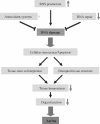DNA damage, cellular senescence and organismal ageing: causal or correlative?
- PMID: 17913751
- PMCID: PMC2190714
- DOI: 10.1093/nar/gkm681
DNA damage, cellular senescence and organismal ageing: causal or correlative?
Abstract
Cellular senescence has long been used as a cellular model for understanding mechanisms underlying the ageing process. Compelling evidence obtained in recent years demonstrate that DNA damage is a common mediator for both replicative senescence, which is triggered by telomere shortening, and premature cellular senescence induced by various stressors such as oncogenic stress and oxidative stress. Extensive observations suggest that DNA damage accumulates with age and that this may be due to an increase in production of reactive oxygen species (ROS) and a decline in DNA repair capacity with age. Mutation or disrupted expression of genes that increase DNA damage often result in premature ageing. In contrast, interventions that enhance resistance to oxidative stress and attenuate DNA damage contribute towards longevity. This evidence suggests that genomic instability plays a causative role in the ageing process. However, conflicting findings exist which indicate that ROS production and oxidative damage levels of macromolecules including DNA do not always correlate with lifespan in model animals. Here we review the recent advances in addressing the role of DNA damage in cellular senescence and organismal ageing.
Figures



References
-
- Finkel T, Holbrook NJ. Oxidants, oxidative stress and the biology of ageing. Nature. 2000;408:239–247. - PubMed
-
- Marnett LJ, Plastaras JP. Endogenous DNA damage and mutation. Trends Genet. 2001;17:214–221. - PubMed
-
- Beckman KB, Ames BN. The free radical theory of aging matures. Physiol. Rev. 1998;78:547–581. - PubMed
-
- Kregel KC, Zhang HJ. An integrated view of oxidative stress in aging: basic mechanisms, functional effects, and pathological considerations. Am. J. Physiol. Regul. Integr. Comp. Physiol. 2007;292:R18–R36. - PubMed
-
- Hayflick L, Moorhead PS. The serial cultivation of human diploid cell strains. Exp. Cell Res. 1961;25:585–621. - PubMed
Publication types
MeSH terms
Substances
Grants and funding
LinkOut - more resources
Full Text Sources
Medical

